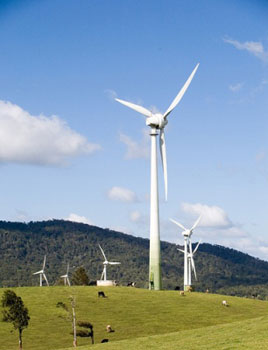
Wind farms provide one form of renewable energy. (Photograph courtesy of RaeA on Flickr.)
Instructor(s)
Prof. Dennis McLaughlin
MIT Course Number
1.020
As Taught In
Spring 2008
Level
Undergraduate
Course Description
Course Features
Course Description
This course provides a review of physical, chemical, ecological, and economic principles used to examine interactions between humans and the natural environment. Mass balance concepts are applied to ecology, chemical kinetics, hydrology, and transportation; energy balance concepts are applied to building design, ecology, and climate change; and economic and life cycle concepts are applied to resource evaluation and engineering design. Numerical models are used to integrate concepts and to assess environmental impacts of human activities. Problem sets involve development of MATLAB® models for particular engineering applications. Some experience with computer programming is helpful but not essential.
Other Versions
Other OCW Versions
Archived versions: ![]()


